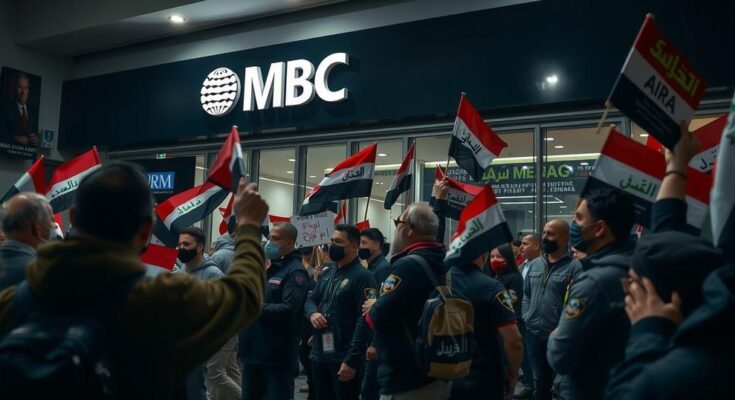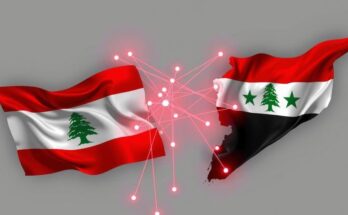Iraq has suspended the license of the Saudi-owned MBC Media Group following protests triggered by a report labeling leaders of Iranian-backed groups as terrorists. The Iraqi Communication and Media Commission announced the suspension after armed group supporters stormed the channel’s Baghdad office in response to the controversial broadcast. This incident reflects the complex dynamics of media portrayal within the politically sensitive landscape of Iraq.
The Iraqi government has suspended the operating license of the Saudi-owned television channel, MBC Media Group, following significant unrest stemming from a controversial report aired by the channel. The report labeled various leaders associated with Iranian-backed armed groups, including figures from Hamas and Hezbollah, as “faces of terrorism,” which incited protests that culminated in supporters of these groups storming the MBC offices in Baghdad. In response to the protests, the Iraqi Communication and Media Commission issued the suspension, asserting the need to take further steps to revoke the channel’s operational rights. This incident marks a significant escalation in the ongoing tension between Iraq’s diverse political factions and foreign media portrayals, with the protests around the MBC office featuring demonstrators voicing opposition to the Saudi media presence. The channel subsequently removed the contentious report, though Saudi Arabia’s Media Regulatory Authority has indicated a review of its legal options concerning this incident.
This incident occurs in a context where media narratives in the Middle East are deeply intertwined with regional politics. Channels like MBC have faced scrutiny for their coverage of sensitive topics involving Iranian influence and associated militant groups. The depiction of these groups as terrorist entities is particularly contentious, especially in Iraq, where some factions view them as resistance groups. This illustrates the profound implications media outlets face when their broadcasts challenge the prevailing political narratives or provoke factions that are sensitive to such labeling. The ensuing protests and reactions indicate the delicate balance of media freedom versus political sensitivities in the region, highlighting Iraq’s complex political landscape involving various armed groups and foreign relations, especially with Iran and Saudi Arabia.
In summary, the suspension of the MBC Media Group’s license in Iraq exemplifies the volatile interplay between media representation and political alliances in the Middle East. The swift backlash against the channel’s reporting underscores the sensitivities surrounding the characterization of prominent Iranian-backed leaders and the potential ramifications for international media operating within Iraq. Such developments raise critical questions about media freedom and its boundaries when confronted with explosive geopolitical themes in the region.
Original Source: www.nytimes.com




